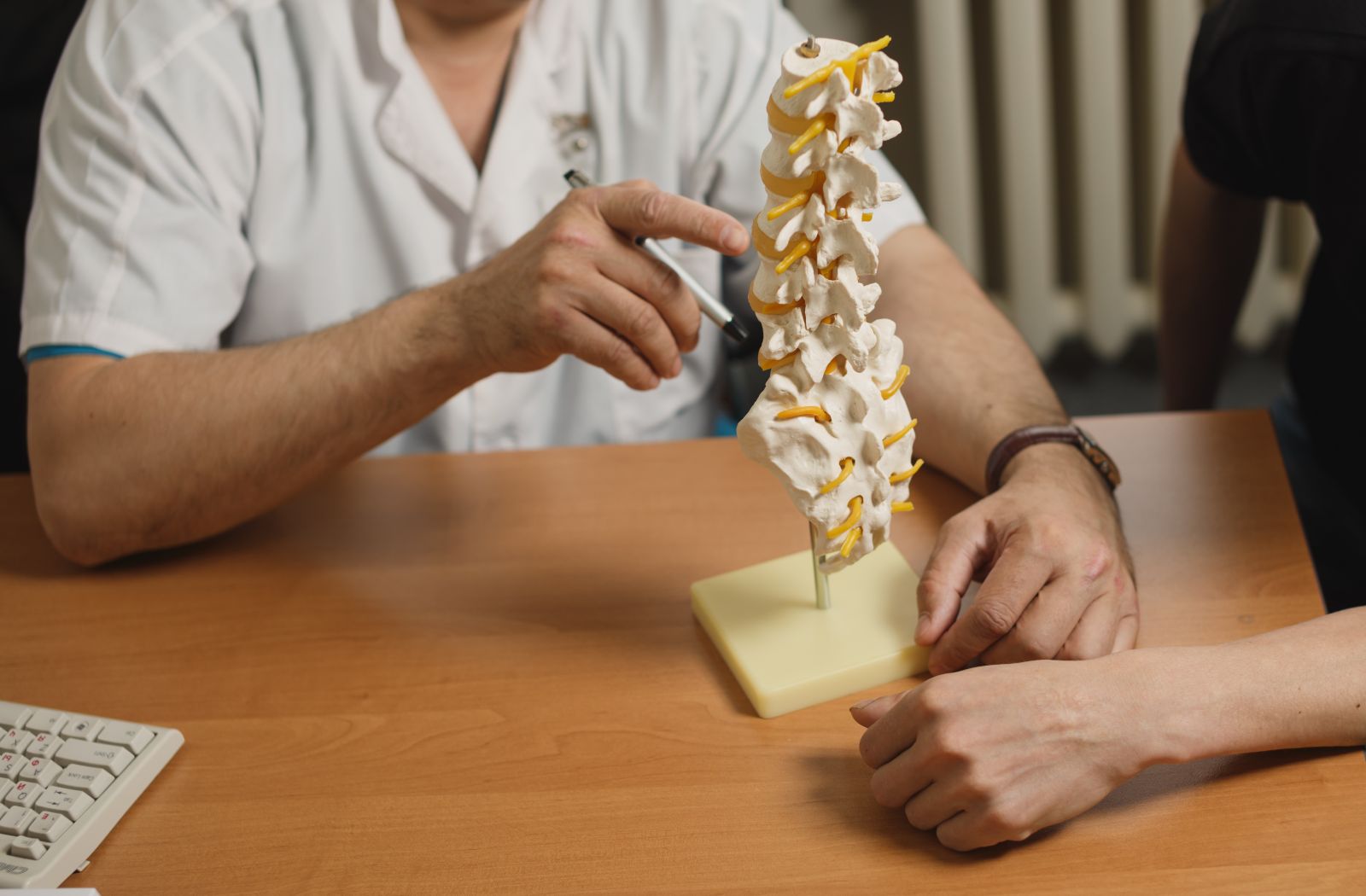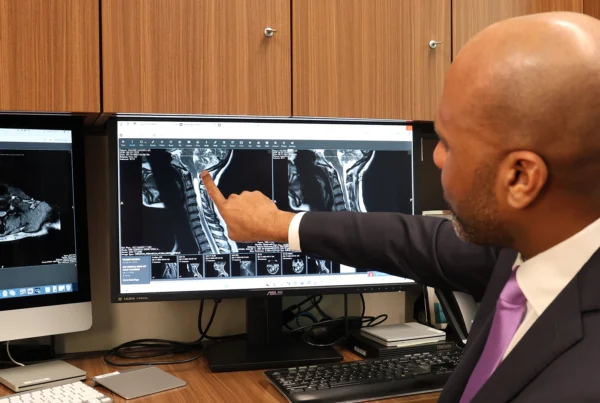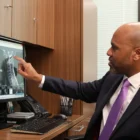Spinal fusion surgery is a common procedure aimed at treating a variety of spinal conditions that cause chronic pain, instability, or deformity. The surgery eliminates motion at the affected segment by permanently connecting two or more vertebrae, providing relief and stability.
If you are facing the possibility of a spinal fusion, then “How long does it last?” is undoubtedly one of the biggest questions on your mind. Here’s everything you need to know.
Spinal Fusion Surgery
Spinal fusion surgery is a procedure designed to permanently connect two or more of your spinal vertebrae. The intervention is intended to prevent the vertebrae from moving.
Surgeons achieve long-term immobilization by placing bone graft between the two vertebrae, which will eventually heal to the existing bone of your spine. Initially, screws, rods, or plates are implanted to stabilize your spine.
A variety of conditions can be treated with fusion surgery, including the following:
- Degenerative Disc Disease: Wear and tear of your spinal discs that can lead to reduced mobility and pain
- Spondylolisthesis: Occurs where one vertebra slips forward and over another, due to instability
- Scoliosis: Abnormal curvature of your spine that may require stabilization to prevent it from worsening
- Spinal Stenosis: Narrowing of the spinal canal, which compresses nerves. In certain cases, you may require a fusion after decompression surgery
Learn more about your options for relief by scheduling a consultation with Neurosurgeons of New Jersey.
Expected Longevity of Spinal Fusion
The procedure is intended to be a permanent solution and reduce or eliminate pain. So does spinal fusion last forever? If the bone heals successfully, the answer is “YES”.
Once the bone graft successfully fuses with your vertebrae, the more important question would be “what other issues can develop following a successful fusion?”
It's time to get back
to doing what you love.
When answering the question, “How long does a spinal fusion surgery last?” It’s important to consider a couple of variables.
Patient Health and Lifestyle
Your health at the time of the procedure will have the biggest impact on your fusion success. Younger patients tend to bounce back faster and may have better long-term outcomes. However, they may also place greater stress on the fusion, especially if they are very active.
On the other hand, conditions such as osteoporosis or diabetes can affect bone healing and fusion success. Smoking is another factor that could negatively impact your outcome.
With that in mind, the question, “How many years does spinal fusion last?” can be tough to answer. Therefore, it’s vital to consult with an experienced surgeon.
Surgical Techniques and Hardware
The method used to perform spinal fusion and the type of hardware your doctor uses may have a critical impact on the procedure’s success. The use of implants will stabilize your spine while the graft takes hold. There are different materials and locations where bone graft can be placed, which will also impact the healing process.
How long does spinal fusion hardware last? It’s designed to last a lifetime. However, the screws and plates can fail, if the fusion does not heal completely.
Potential Long-Term Consequences
The answer to the question, “How many years does a spinal fusion last?” will largely depend on how well you adhere to lifestyle changes recommended by your surgeon and whether you encounter any adverse consequences associated with spinal fusion. Here are some short and long-term risks of spinal fusion surgery.
Adjacent Segment Disease (ASD)
Fusing your spine alters its mechanics and increases stress on the spine next to the fusion. This can advance degeneration, cause new symptoms and lead to a condition called adjacent segment disease. Severe cases of ASD may require additional surgery.
Hardware Failure
If the bone does not heal, the screws, rods, or plates used during the surgery may loosen or break. Hardware failure can cause discomfort, limit mobility, or necessitate revision surgery.
Persistent or Recurrent Pain
While most patients experience pain relief after surgery, some may continue to have discomfort due to the following:
- Nerve damage sustained before the surgery
- Non-union, which means the vertebrae didn’t fuse successfully
- Degeneration of other parts of the spine, adjacent segment disease
- Undisclosed sources of pain not related to the spine
It’s important to set realistic pain goals before deciding to undergo spinal fusion. Talk to your surgeon about your condition and what sort of relief you may experience.
Studies and Research on Long-Term Outcomes
Research studies have tackled the question, “What is the outcome following fusion?” The outcome is dependent on patient factors, disease treated, and surgical technique. Under the appropriate circumstances, spinal fusion has been known to provide significant benefit.
A study of 294 patients followed up with patients over a range of 9-22 years. The mean follow-up period was 12.8 years. The patients were randomly assigned to a non-specific physiotherapy program or lumbar fusion.
Two-thirds of patients in the fusion group reported that their condition was “better or much better” during the follow-up. Only one-third of the conservative group fell into the “better” or “much better” categories.
Enhancing the Longevity of Spinal Fusion
You play a key role in ensuring the long-term success of your spinal fusion surgery. Here are things you can do to enhance the success of the procedure.
Postoperative Care
What you do in the days and weeks following your surgery will have a drastic impact on your long-term success. Make sure you attend physical therapy and follow all activity restrictions implemented by your doctor. Even minor deviations from post-operative protocols can increase your risk of complications.
Lifestyle Modifications
Making healthy lifestyle choices can impact the durability of your fusion. Making sure you take in sufficient calories and protein during the post-operative period will increase the likelihood of successful bone healing. Long-term, maintain a healthy weight to reduce stress on your spine and minimize the risk of complications. Avoid or quit smoking to improve overall health. Once cleared to do so, engage in appropriate low-impact activities to strengthen your spine and supporting muscles.
Regular Follow-Up
Consistent follow-up care with your provider is vital. Obtain regular imaging of your fusion site to ensure it is healing as expected.
If you have any concerns, contact or schedule an appointment with your surgeon right away. They can help you identify the root cause of the problem and make recommendations for preventing more serious issues.
Connect With Neurosurgeons of New Jersey
If you’d like to know how long spinal fusions last for patients facing similar circumstances as you, it’s time to consult with a surgical expert who specializes in these types of procedures. A skilled surgeon can help you weigh the pros and cons of a spinal fusion.
At Neurosurgeons of New Jersey, our expert team can help you identify the best solution to address your spinal issues. Talk to a surgeon about whether a spinal fusion is indicated and the consequences of undergoing a fusion.
You can book an in-office consultation or schedule a telehealth appointment. Our office can often accommodate same-day telehealth consultation requests, which gets you the answers you need quickly.

About Ridgewood
Our team of board certified physicians, located in Ridgewood, New Jersey, are dedicated to bringing you the latest developments and treatment options for spinal surgery. We strive to produce the most clarified & clear content to help you make informed decisions on your medical journey. The road to feeling like your true self should not feel lonely- Let us help you. Please call us to schedule a consultation and speak to one of our team members.






